Levelling up: What does it mean for people in Yorkshire?
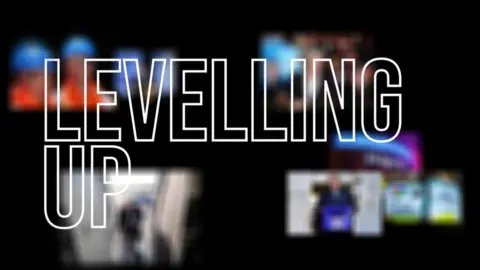 BBC
BBCThe Labour mayors of West and South Yorkshire have warned that the Conservative's "levelling up" campaign needs to be more than just a slogan.
Since appearing in the party's 2019 election-winning manifesto, the term has featured heavily in press releases, sound bites, interviews and social media posts.
Ahead of the Autumn Budget on Wednesday, BBC Yorkshire's Political Editor James Vincent takes a look to see if it's having any impact on the region and what it might mean in the long-term.
What is levelling up?
A successor to "Northern Powerhouse", another Westminster favourite, levelling up is a catch-all term for anything seen to bring economic or social benefit to anywhere outside London.
The idea is that people and communities who feel they have been left behind get a chance to catch up.
Levelling up was a huge deal during the 2019 General Election, helping the Conservatives win seats in Doncaster and Rotherham that they'd never won before.
In its manifesto that year, the party said the term included investment, more devolved control of that investment, a £3bn National Skills Fund, support for farming and fishing industries and the creation of up to 10 freeports.
At this year's Conservative Party Conference, Prime Minister Boris Johnson said he would "get on with the job" of levelling up, but some of his Conservative colleagues say it must be more than just another headline-grabbing term.
When asked what it means for people in Yorkshire, the Department for Levelling Up, Housing & Communities said it was about "investing in ambitious local plans" aimed at empowering local communities, boosting living standards, spreading opportunity and improving public services, and "restoring local pride".
How big is the gap?
Because the term covers such a broad topic, ranging from quality of life to quantity of buses, it's hard to see exactly what the government wants to achieve.
That is why they are under pressure now, two years on from the election, to deliver on the promise.
We are expecting a White Paper on levelling up which should lay all of this out - but there's no date for that at the moment.
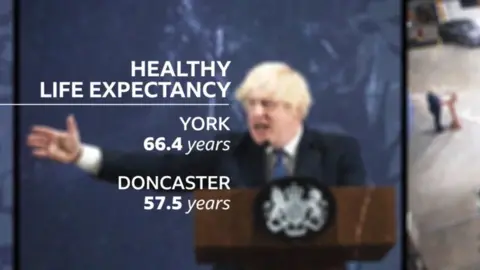
But if we look at healthy life expectancy as one of the basics of quality of life, there is a substantial gap.
In Doncaster, on average, a woman would have 57.5 years of healthy life and in Hull it is lower still at 56.
But in Oxfordshire, where the Prime Minister was first elected as an MP, that figure is 69.4 - that's more than 13 years of healthy living because of where you were born.
But the inequalities aren't restricted to the north-south divide, they can also be seen much closer to home.
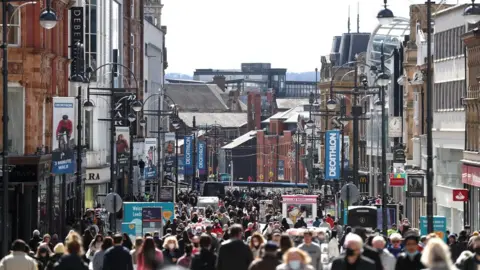 Getty Images
Getty ImagesIn York, nearly half the working population has a higher education qualification, but in Doncaster that figure is 25% - as pointed out by the Prime Minister in his July levelling up speech.
He also mentioned Leeds, asking: "Why is it that Leeds has one in five working age people not in work, while in Bradford next door the number is as high as one in three?"
The Towns Fund is one of the Government's big pots to help "level up".
Doncaster is receiving over £40m from it, but over the last 10 years the local authority says it's lost nearly £80m in government funding.
There is another pile of money called the Levelling Up Fund, but that became controversial here when it emerged that Richmondshire in Chancellor Rishi Sunak's constituency, was higher up the priority list for that money than Barnsley.
What is the progress so far in Yorkshire?
It's fair to say the pandemic has slowed a lot of government plans down, but it's also fair to say the pandemic has exposed the north-south divide.
Northern England seems to have fared worse during the last two years. The previously mentioned funds have been set up, but critics say they don't fully replace money taken from these places in the last decade.
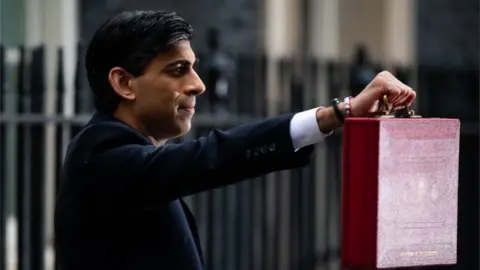 PA Media
PA MediaWe suspect that there won't be any news on the HS2 or Northern Powerhouse Rail infrastructure upgrades in the upcoming Budget.
Leaders here have been waiting for the Integrated Rail Review for months with the prevailing wisdom being that the Eastern leg of HS2 to Sheffield and Leeds may now not happen.
Government jobs are being moved out of London, with the UK's first infrastructure bank and a Department for Transport hub coming to Leeds and a chunk of the Treasury heading to Darlington.
But Boris Johnson's team has been criticised for not setting any targets for levelling up or defining what it means.
However, Michael Gove's appointment as Secretary of State for Levelling Up and the renaming of a department for it have been seen signs that things may start moving forward.
What do Yorkshire's politicians make of it?
Dan Jarvis, Mayor of South Yorkshire and Labour's Barnsley Central MP, said he believes levelling up is currently "smoke and mirrors".
"To date it's nearly all slogan and very little action, there isn't a plan to underpin this," he said.
His West Yorkshire counterpart Tracy Brabin agrees that the term needs to be more than just words.
"This is a slogan and it's been churned around and mulled over, she said.
"They will be held to account by the electorate."
Meanwhile, Alexander Stafford, the Conservative Rother Valley MP, who was elected for the first time in 2019, said the phrase is "about improving life chances and opportunity".
"The question is, 'is your life better now' when the next election happens - if the answer is yes, then we've achieved levelling up."
Nick Fletcher who became Don Valley's first ever Conservative MP in 2019, says people are keen for action.
"Sometimes when I knock on the doors people do ask me what it actually means," he said.
"It's definitely a phrase that's catching on."
Do people in Yorkshire know what levelling up means?
It may be catching on, but do people understand it?
A recent Centre for Cities poll with 3,000 respondents found 47% of people in Yorkshire & the Humber said they understood the term, with 51% saying they were confident the goal was achievable in our region.
On the streets of Hull, commuters say the levelling up priorities should be focussed on our high streets, improving wages and street safety.

Adam McDermott, a 25-year-old team manager in telesales, said he'd not heard the term but his focus would be on turning around the rocketing number of empty shops.
"I've seen the city centre become quite derelict so I want something to initiate getting start-ups in here or reducing the rent that they have to pay to the council to help get companies back in to a city that people want to return to again," he says.
It's a "vague" knowledge of levelling up for Amy Evans, who's 22 and works in sales.
"Raise minimum wage - just enough so that we can live comfortably without having to sacrifice other things in life," she said.
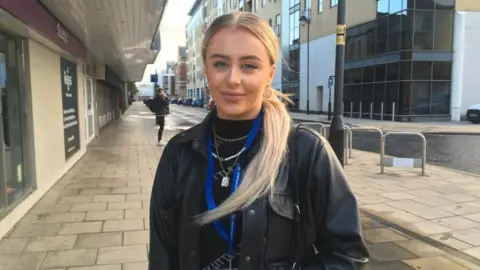
Elsewhere it's a new term for 19-year-old Danielle Spinks, who feels street safety in her city "needs to be knuckled down on".
"I feel like most people these days they go out on their own even at night time and they don't feel safe, they feel like they can't," she said.
"I just wish it'd be like where we could walk around at night time on our own and not have to feel like we're looking about if people are walking behind us."

Follow BBC Yorkshire on Facebook, Twitter and Instagram. Send your story ideas to yorkslincs.news@bbc.co.uk or send video here.
